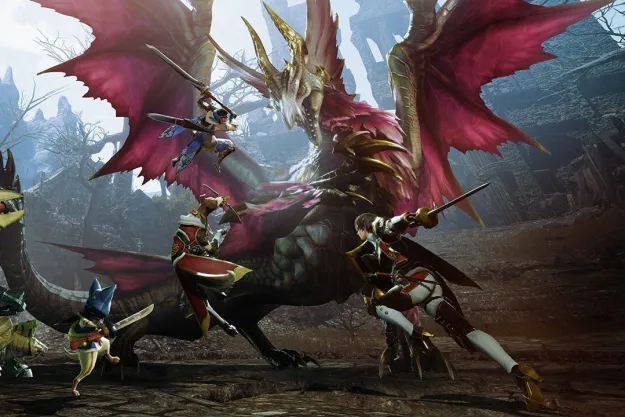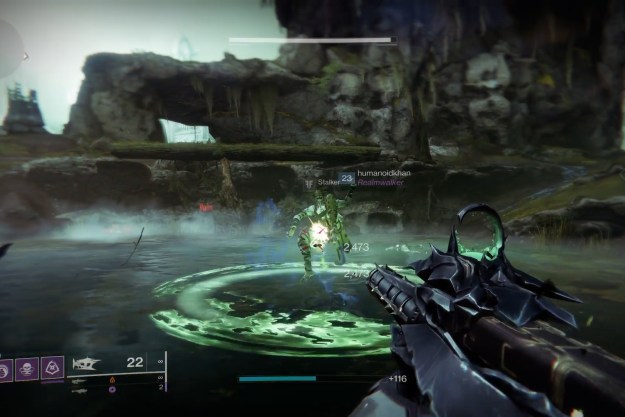Destiny 2 is an extremely dense game. Before today, I’d played it for around 15 hours and already had that message imprinted deep in my brain. There’s a ridiculous amount of content in this game, so many locations to visit and nonplayable characters to talk to. For a new player, it’s all overwhelming. It’s why I struggled to start playing the game to begin with. It floods you with so many icons and pop-ups that you’ll immediately want a simpler experience.
But I decided to try Destiny 2 again just for its latest expansion, The Witch Queen. If you’ve been paying attention to fans of the game, Witch Queen is already the best thing since sliced bread. For what it’s worth, they’re kind of right! I don’t have the same fervor as fans of the game, who know who Savathun is, why she matters, and what’s happening in the story. Still, it’s fun to run around in her Throne World, shoot Light-powered enemies, and get new weapons, especially with friends.
At the same time, Destiny 2‘s Witch Queen expansion isn’t made for new players, especially those who don’t know the overall gameplay loop too well. Offering nothing in terms of a story explainer, Witch Queen throws players into the deep end immediately, assuming they know everything about the game from the get-go. For a new player, it’s about as bad an introduction as you can get.
A wall of features
So far, I’ve played around three hours of Witch Queen, which in the grand scheme of things isn’t a whole lot. But in that time, I, along with one of my housemates who is extremely into Destiny 2, have completed a number of the expansion’s main missions, taken part in some open-world activities, and earned a fair bit of loot.
My takeaway from all of that is that Destiny 2 is a fun game, as long as you spend a bit of cash. Witch Queen itself is $40, and that doesn’t include its season pass, so toss another $10 on top of that. For $50, I made Destiny 2 into an enjoyable experience. Witch Queen actually made it feel like there was something to do in the game, which is probably how anyone who’s ever bought an expansion for the game has felt.

For $50, I also got access to even more systems inside of Destiny 2, and that’s where things take a sharp turn. I, again, don’t know much about Destiny 2. The game’s flood of NPCs, vendors, and systems scared me off more than once, and are why I never got into it properly any other time I’ve tried it. This time around I was already in the hole for $50, so I had to at least get something out of the experience.
But Witch Queen only adds more of what drove me off every other time I played Destiny 2. While playing I kept getting more resources used for upgrading weapons, and eventually was pointed to a new mechanic that lets players make their own weapons. While the process for creating a weapon was explained, it wasn’t done clearly.
At this point, I’d rather take a step-by-step PowerPoint presentation detailing the process that treats me like a fool rather than one that assumes I’m used to Destiny’s way of doing things.
When it comes to Destiny 2, new players are fools. The game is an ocean at this point, and jumping into it is like going swimming without ever having seen a puddle. The only thing Witch Queen has done is make that ocean even deeper. I’m enjoying Destiny 2 now, finally, but as a new player, it can be hard to like. Shooting aliens, getting new gear, that’s all stuff that I know already, sure. It’s everything in-between that remains as mysterious as Savathun’s intentions.
Destiny 2: The Witch Queen is available now on PC, PS4, PS5, Xbox One, and Xbox Series X/S.
Editors' Recommendations
- Destiny 2: The Final Shape’s new subclass combines light and dark
- Destiny 2 studio Bungie hit by layoffs, internal game delays
- Destiny 2: Lightfall fails to deliver its Avengers: Infinity War moment
- Why the Destiny 2 and Fortnite collab makes perfect sense for Bungie
- The next year in Destiny 2 is ‘the beginning of the end’




